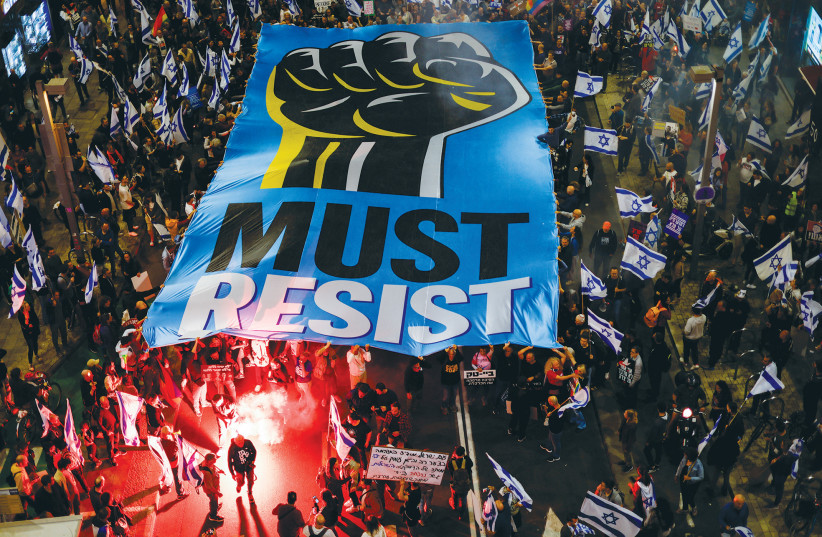Israel’s Declaration of Independence contains 650 words in its original Hebrew text. The anti-judicial reform activists demand that its principles should be at the center of the current crisis as regards the makeup and direction of our legal institutions.
On the recent “Day of Disruption,” an almost cute clip was uploaded to social media platforms of nursery school toddlers being marched out to the sidewalk by their supervisors chanting “de-mo-cra-ti-ya.” I am not sure that at that tender age the more intrinsic details of how democracy works are in their grasp. Truth be told, unless our liberal/progressive class all of a sudden has adopted the pedagogic methodology of Mea She’arim, that procession appeared as if it happened in Pyongyang.
It is quite possible, though, that Yair Lapid of the Yesh Atid party, graduated from such a preschool class. Worse, he may not have read carefully our Declaration of Independence with the required scrutiny.
In his interview with Ben Caspit and Amit Segal on Channel 12, on March 4, when challenged by Segal – to respond to a 2005 column which he’d penned, in which he demanded that protesters blocking main thoroughfares be removed by the police within minutes, by force if necessary – as to why he does not make the same demand today when highways are blocked, Lapid was unfazed.
He adamantly retorted to Segal, “I am sick and tired of comparisons to what was then... it’s different… years have passed, the circumstances are different, the people are different… it’s a whole different world.” Different? That smacks of a class conflict over national and cultural identity.

One core element of democracy is equal protection before the law. That is what the secular, liberal-to-progressive camp demands of the haredim as regards military service, payment of taxes, being employed gainfully as well as egalitarian prayer gatherings at the Western Wall Plaza, for example.
All of that, and more, ever since Shulamit Aloni’s days of litigation and legislation beginning in 1965, are essential goals of our liberal camp that are predicated in our Declaration of Independence. There is a problem, however. The word “democracy” simply does not appear in the document. America’s Declaration of Independence also does not include the term. But, then again, since 1641, various enacted laws authorized slavery in that country until 1865.
The drafters of our May 14, 1948 document did declare that Israel “will foster the development of the country for the benefit of all its inhabitants”; that it will be “based on freedom, justice and peace”; that it will “ensure complete equality of social and political rights to all its inhabitants irrespective of religion, race or sex”, among other lofty goals. The Arab inhabitants would benefit from “full and equal citizenship and due representation.” Those are what make up a democracy, but there is more. Are the bodies of government balanced and checked? Most importantly, is there a culture of democracy?
Regime hegemony is the root of the protests
AT THE root of the judicial reform initiated by Yariv Levin and Simcha Rothman are four main issues: an override clause; appointment of justices; the “reasonableness” qualifier; and the role of the attorney-general and the ministerial legal advisers. But those are just external representations to the deeper, internal conflict that is pitting citizen against citizen.
The struggle isn’t over those concerns. It is over regime hegemony I maintain. For over 100 years, the Zionist Left has been opposing the Zionist Right and struggling to assure it cannot effectively influence the pre-state and post-1948 state’s political, social and cultural makeup.
That struggle was in pre-state days, and continues to be, not as much over values, goals, methods and beliefs but rather who will control the institutions of power. The issues were who will supervise the defense policy, who will be allowed to immigrate, who will be employed, who will receive land for settlement and who will represent the values of the Yishuv, and then the state.
Karl Marx wrote in his Manifesto of a Klassenkampfen, about “class struggles.” I would suggest we are witnessing in Israel, not so much clashes over economic issues, although those exist, but rather there is a cultural class hegemonic conflict over issues of tradition, identity norms and values – all based on the restoration of social order. The definition of “order” is at the core of the protests.
Sociologists, such as Peter Henry Jacob Achterberg, suggest that “a rise in wealth causes political cultures to become less class-centered and more culture-centered.” To follow a recent Batya Ungar-Sargon comment on the phenomenon of progressive politics, what is roiling in our streets are angry people who have abandoned economic interests, so as to fight a culture war pushing their own values.
These values include a marked process of secularization, the mimicking of Western progressivism behavior, success as signified by one’s wealth deriving from global markets and preferring to have their political culture to be a culture-centered one.
Prosperity and secularization affect the degree to which the political culture of a country is determined. This determination seems to be now less by classic economic class issues and more by cultural and wealth issues.
This is due to the fact that the more central to the political culture prosperity and secularization these issues become, the more the country’s institutional order (elections, political representation, the character of judicial decisions and, of course, religion in the public square) is influenced by a growth of alienation and anomie.
These twin maladies of modernity, anomie and alienation, are reflected in rising levels of problems with meaning and identity and institutional distrust in modernized countries. The intention of Israel’s Riskified fraud management platform heads to move to Portugal, and the withdrawal of the deposits of Papaya Global is just a reflection of this trend.
The struggles of Israel’s society are not over political democracy but cultural dominance.
The writer is an analyst and an opinion commentator on political, cultural and media issues.
